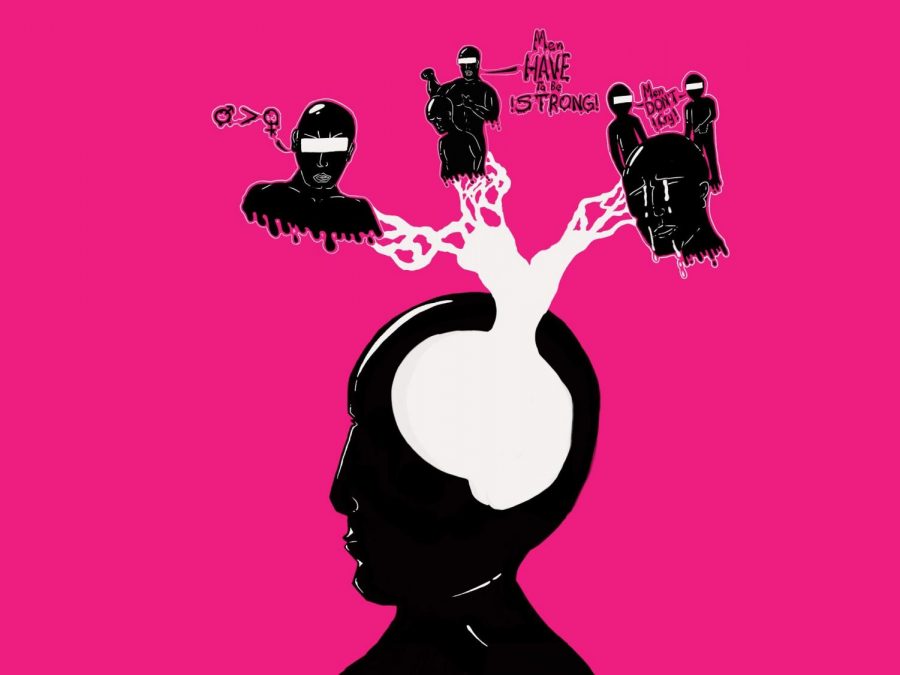Holding men accountable
Addressing the issue of toxic masculinity
Photo courtesy of Creative Commons
From a young age, men are taught that showing emotion is “weak.” Misogynistic behavior, mental health issues and violence stem from this mindset.
December 1, 2021
Boys will be boys.
A common, casual phrase that has been used to dismiss toxic behavior displayed by men. Although the subject has been brought to light over the past decade, the issue of toxic masculinity is a problem now more than ever. America as a whole needs to change its societal standards for men.
According to The Atlantic, toxic masculinity is defined as what can come from teaching young boys that they can’t express emotions openly—that they have to be “tough” all the time, and anything other than that is frowned upon and considered “weak.” Toxic masculinity causes problems for the men affected by it and the people around them. There’s plenty of room for someone to be masculine without being toxic or engaging in behavior that’s dangerous or hurtful.
Traits of toxic masculinity include mental and physical toughness, aggression and emotional insensitivity. It leads to many forms of violence, including verbal and physical violence. Toxic masculinity doesn’t just involve obvious displays of aggression or discrimination — it often shows up in subtle ways you may not even recognize. A single misogynistic comment from an individual may lead to more severe displays of toxic masculinity in the future.
As stated by the New York Times, the razor company Gillette released an advertisement in 2019 titled “We Believe: The best a man can be.” The ad challenges viewers to confront issues of toxic masculinity that manifest in acts like bullying and catcalling. It suggests that men abandon the “boys will be boys” mentality and instead hold men accountable for misogynistic attitudes and behavior. The advertisement sparked many conversations relating to the topic. Not only does toxic masculinity lead to problems with the men affected by it, but it also leads to abusive relationships. The stereotypical emotional unavailability that men often possess is a huge issue. This behavior needs to stop being dismissed as “boys will be boys.” In reality, effective communication is a skill that everyone should possess, not just women.
The thing is, men affected by toxic masculinity aren’t the only people who contribute to it. From a young age, we are taught that harmful behavior is “normal.” For example, a little girl comes home from school upset saying that a boy in class was making fun of her. The mother smiles and says “that means he likes you.” This teaches young girls that toxic behavior from men is normal, and leads to abusive relationships in the future.
This destructive behavior has many societal effects, including sexual assault, violence and social exclusion. Toxic masculinity teaches men that aggression and violence are key to solving problems—unless you want to appear weak. The resulting violence, including relationship violence and gun violence, can have far-reaching effects on those who aren’t even directly involved. Since 1982, an astonishing 119 mass shootings have been carried out in the United States by male shooters. Additionally, estimates published by The World Health Organization indicate that globally about one in three women worldwide have been subjected to sexual assault by men in their lifetime.
What many people don’t realize is that toxic masculinity harms men, too. As stated by Healthline, adhering to toxic masculinity can affect men’s physical and mental health, contributing to poor sleep and depression. Other research suggested that men are less likely to see a doctor when necessary out of fear of appearing weak. This kind of thinking may also prevent men from seeking important preventive care.
There are plenty of men that don’t display traits of toxic masculinity. Still, these people might be impacted by those who do. Those who don’t fit inside that predetermined box of what it means to be masculine are made fun of. This leads to prejudice against those in the LGBTQ+ community and others who they believe to be not “manly.” Many LGBTQ+ teens have reported being threatened and bullied because of their sexuality. A large amount of homophobia stems back to toxic masculinity. Every individual, regardless of their sexuality, ethnicity or race should be able to feel safe in their community.
There’s no single answer to addressing the issue of toxic masculinity. Doing so requires societal shifts around several things, including gender stereotypes and the stigma surrounding mental health. But if you’re a man or a male-identifying person, there are a few things you can do to reduce the impact of toxic masculinity in both your own life and the lives of others around you. Acknowledge your mistakes, don’t try to be someone you aren’t, and talk to others about what you can do to help end this issue.







